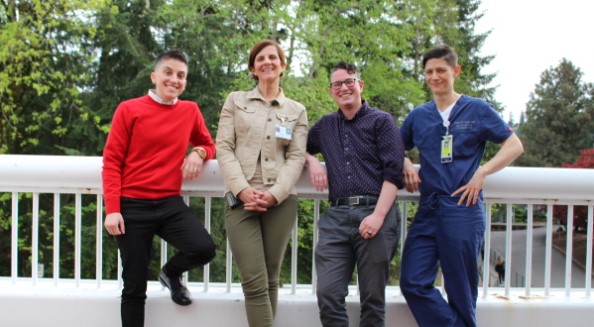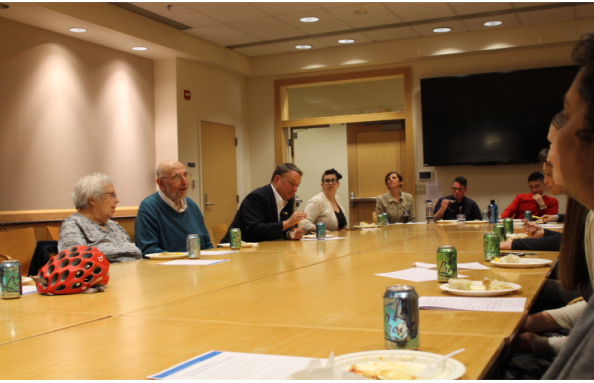At the end of April, CHSE hosted a “Mitch Dinner,” a roundtable discussion that honors the work of Representative Mitch Greenlick by focusing on public health and health services research topics. Dr. Greenlick was one of the first people to receive a PhD in health services, the founder and director of the Kaiser Permanente Center for Health Research in the 1960s, and Chief of the Department of Public Health and Preventive Medicine at OHSU in the 1990s. He’s been an important mentor to CHSE’s director, John McConnell. This Mitch Dinner focused on healthcare utilization and services for transgender and gender nonconforming (GNC) individuals. Since 2003, Greenlick has served in the Oregon House of Representatives, and today represents House District 33. He serves on the House Committee on Judiciary and the House Committee on Health Care, and is planning to retire at the end of 2020.
This Mitch Dinner focused on health care utilization and services for transgender and gender nonconforming (GNC) individuals. Health care payers and providers are increasingly interested in how to improve care for the trans and GNC community – especially in states like Oregon, whose Medicaid insurance, since 2015, has covered gender-affirming services, from hormone therapies to surgeries (read about our research looking at effects of Oregon’s Medicaid policy changes on disparities experienced by transgender people).

Our panelists included four local experts: Jae Downing, Ph.D. (pronouns: they/them), Assistant Professor at OHSU-PSU School of Public Health; Christina Milano, M.D. (she/her), OHSU Family Medicine physician and co-founder of the OHSU Transgender Health Program; Jess Guerriero, M.S.W., M.A. (they/them), Social Worker, OHSU Transgender Health Program; and Gene de Haan, M.D. (they/them), Obstetrics and Gynecology physician at Kaiser Permanente.
The discussion centered around four themes.
Realities in providing gender-affirming and transition-related care
In January 2015, Oregon Medicaid (also known as Oregon Health Plan or OHP) began covering transition-related care, such as hormones or surgical and mental health services, for beneficiaries diagnosed with gender dysphoria. It was anticipated an influx of transgender and GNC people would seek care through Oregon’s medical system. Dr. Milano remarked that although regional hubs such as OHSU’s Transgender Health Program (THP) have expanded services and recruited practitioners, barriers to both transition-related care and culturally competent gender-affirming care remain.
One barrier Dr. Milano and her team address is providing training. “We are constantly...in the field training people on providing hormone therapy, which is something that any primary care provider care do, any nurse practioner can do, any physician’s assistant can do. We can go out and try to work on that issue and improve access to care,” says Milano.
Dr. de Haan, an obstetrics and gynecology physician at Kaiser who works with the trans community, discussed the issues between commodifying transition-related care to ensure a wait list of guaranteed surgeries, and easing the backlog by creating an affirming environment. Dr. de Haan explained some trans people mistakenly believe they must be treated by a surgeon who can perform a “trans hysterectomy.” But Dr. de Haan pointed out a hysterectomy is just a removal of a uterus.
“People don’t need to drive everywhere to go to one surgeon who has created this idea that ‘I am the person who knows how to provide trans hysterectomies.’ We need to train all providers who can affirm all identities," they said.
"I am the transgender specialist in gender-affirming care for gynecology and that’s great, but we don’t need to have these long wait lines for a surgery that anyone can provide--with proper training--and people need to know that."
A gender-dysphoria diagnosis is a prerequisite for Medicaid coverage for transition-related care. Panelists stressed the friction between this diagnosis as a means to an end (reimbursement) versus body autonomy. Jess Guerriero, a social worker at THP, is careful not to attach the diagnosis to THP clients who don’t want it or for anyone who is not seeking care for medical transition.
“There is no reason to apply a diagnosis unless someone meets all the criteria or fits well into that criteria,” says Guerriero.
Dr. de Haan observes that every patient reacts differently to the economic and psychosocial consequences of this diagnosis. “Some people really identify with having gender dysphoria and having a thing that’s a treatable condition, where many of us other people don’t feel that way at all...We can’t define a community by diagnosis, but it’s a thing we have to work with in order to get things done. We have to be as transparent as possible when you’re talking to patients about why you’re doing it.”
Although the panelists observed structural barriers, they optimistically observed growing numbers of transgender and GNC individuals seeking transition-related care, and noted progress in creating gender-affirming environments. For example, electronic health records and printed documents were being updated to reflect patients’ gender identity and affirmed names. Audience members included practitioners who were eager to receive training, possible signs of cultural and medical shifts toward gender-affirming care.
Coverage for transition-related care
Medicaid coverage for transition-related care is a recent policy change, and panelists discussed how implementation affects providers and trans and GNC beneficiaries.
"Some states have Medicaid programs that have passed a non-discrimination rule that says, for example, if your plan provides hormones to a cisgender woman you also need to offer it to everyone else. A lot of Medicaid programs say this. However, this plays out in practice very differently,” said Dr. Downing.
Dr. Downing interviewed primary care providers in a state which covers transition-related services and learned they were uncertain what Medicaid did and did not cover. Furthermore, Dr. Downing explained, it was difficult to find policy documents that clarified these decisions.
Guerriero called Oregon’s coverage “comprehensive,” but pointed out the omission of reimbursement for facial feminization surgeries or depilation.
“OHP will cover hair removal if it’s part of a prerequisite for surgery, but I speak to far more trans-feminine women or transwomen who say 'Genital surgery is so far off for me,' or, 'I am not interested in this, but the thing that impacts my safety on a day-to-day basis is the way that people read my face.'”
Dr. Milano added, “The burden is on us [providers] to explain over and over again that this is not a cosmetic procedure, that this is a necessary procedure.”

The quality of care for the transgender community
The panelists repeatedly referenced the 2015 US Transgender Survey, in which over 28,000 transgender and GNC respondents reported their socioeconomic, religious, educational, and health experiences. Guerriero cited the statistics that 50% of transgender and GNC people reported some sort of discrimination or fear of mistreatment in the medical setting; 77% believed they would be treated poorly in a medical setting.
Dr. de Haan, who described themselves as visibly identifiable as a gender-expansive person, said their own experience can be an indicator of the reaction a GNC patient will receive. “Walking around the hospital, it’s a little bit of a litmus test,” they said. “How the nurse is interacting with me will give me some idea of how a nurse will interact with a patient.” Twenty five percent of the patients Dr. de Haan treats identify as transgender.
According to the 2015 US Transgender survey, "23% reported that at some point in the past year they needed health care but did not seek it due to fear of being disrespected or mistreated as a trans person."
Panelists and audience members discussed how advocates such as the THP and the younger generation of students are driving cultural competence efforts. Consequently, this year OHSU medical students had their first standardized patient experience training wherein the simulated patient wanted to start hormones.
Should gender-affirming services be its own specialty?
The panelists debated whether gender affirming services ought to be its own specialty. In arguments for specialization, panelists acknowledged that gender affirming care comprises a large body of knowledge that might necessitate formal medical training. Dr. Milano asserted nuance and experience is needed when, for example, gender-affirming care occurs in the pediatric setting. Although provision of pubertal blocking hormones is a reversible intervention, it has powerful physical, emotional, and social consequences. As a counter-argument to a gender affirming specialty, another panelist compared gender affirming care to addiction medicine, which has been successfully integrated into various health care fields.
Panelists agreed that ideally gender-affirming training would be integrated into primary and specialty care. Guerriero added it’s important when a young person discloses their identity that their providers and guardians believe and support them.
To learn more, visit the website of OHSU’s Transgender Health Program
About the Center for Health Systems Effectiveness
The Center for Health Systems Effectiveness researches health care service delivery with the aim of improving the value and sustainability of the U.S. healthcare system. Our mission is to provide the analyses, evidence and economic expertise to build a better and more sustainable health care system.
To learn more about the CHSE, visit us on the web or email us at CHSE-info@ohsu.edu.